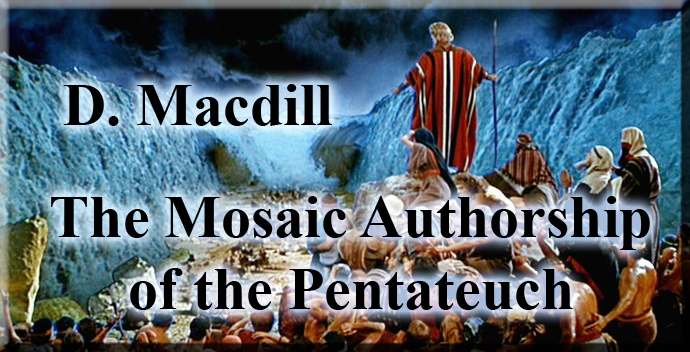
The Mosaic Authorship of the Pentateuch
By D. Macdill
Part II - Objections Considered
Chapter 1
|
OBJECTIONS IN GENERAL The burden of proof rests on the analytic critics, because: 1. There is an antecedent probability in favor of the single authorship of Genesis and of each of the Pentateuch al books. Joint authorship is rare. Almost every book has but one author. A book may have an editor and annotator, who make additions by way of explanations, notes, and references. But even in such cases the book itself is the production of a single mind. Hence, in regard to any book and every book, before examination, and aside from all positive evidence in the case, there is a presumption that it was written by one man. There is, however, no presumption against two or more books having the same author. Many an author, in both ancient and modern times, has produced many books. And if several books, though anonymous, relate to the same subjects, are ostensibly connected with one another, and are found published together, the presumption is that they have a common authorship. There is, then, an antecedent presumption that Genesis, and every other book of the Pentateuch, is the production of one author. And as these books relate to the same subjects, are ostensibly connected, each succeeding book seeming to be the continuation of the preceding one, and are found published together, the presumption is that they were all produced by one author. 2. Added to this, that Moses wrote the Pentateuch is the traditional belief This was the belief of almost all antiquity, pagan. Christian, and infidel. Even Celsus and Porphyry conceded the Mosaic authorship of the Pentateuch, though Bleek does indeed claim the former as on the other side.1 3. Still further, the testimony of Christ and his apostles is in favor of the traditional view. This is admitted by all the analytic critics, except some of the less advanced ones, who have not the audacity to assert fallibility and errancy of the Lord Jesus Christ in biblical matters, and hence feel constrained to seek a way out of the difficulty by denying that he recognized Moses as the author of the Pentateuch. It is thus shown that there is an antecedent presumption that each book of the Pentateuch taken separately, and all the books taken together, had but one author, and that that author was Moses. In these circumstances, the analytic critics, who maintain that the Pentateuch is the product of many minds, ^lust assume the burden of proof. They must positively disprove its Mosaic authorship or lose the case. They join issue with tradition, with antiquity, and with Christ and the apostles, and they are bound to meet the overwhelming presumption thus created against them by the presentation of evidence that will leave no room for reasonable doubt. Clear and incontestable proofs are demanded by the requirements of the case. The extreme probability or rather the absolute certainty, that Jesus, the Son of God, made no mistakes and encouraged no errors, must outweigh all the claims of learning and the whole array of critical names which the analysts may present. Such argumentation is of no avail in the case. Nothing but clear and conclusive proof, or rather disproof — disproof of the Mosaic authorship of the Pentateuch, will answer. But the analytic critics have already presented their case. Their evidence and arguments are in. It is now to be considered whether they have made out their case. Have they disproved the Mosaic authorship of the Pentateuch? Let us weigh their arguments. These come in the form of objections to the traditional belief, and in the main are as follows: Claimed improprieties of thought and speech, which, it is supposed, Moses would have avoided, had he been the author of the Pentateuch; claimed anachronisms, allotopisms, discrepancies, contradictions, and difficulties; historical untrustworthiness; differences in style; the centralization of worship; the neglect and violation of the Pentateuchal laws; the silence of succeeding books in regard to the Pentateuchal books and laws; the finding of the book of the law in the temple, as recorded in the twenty-second chapter of the Second Book of Kings; the character of the Pentateuchal laws as not adapted to a nomadic people, camping in the wilderness, but to an agricultural people, dwelling in fixed habitations. These are in the main the arguments on which the analysts rely for the overthrowing of the view that Moses wrote the Pentateuch.
|
|
 |
 |
|
1) Introduction to the Old Testament, Vol. 1., p. 5.
|
|
-
Site Navigation
 Home
Home What's New
What's New Bible
Bible Photos
Photos Hiking
Hiking E-Books
E-Books Genealogy
Genealogy Profile
Free Plug-ins You May Need
Profile
Free Plug-ins You May Need
 Get Java
Get Java.png) Get Flash
Get Flash Get 7-Zip
Get 7-Zip Get Acrobat Reader
Get Acrobat Reader Get TheWORD
Get TheWORD